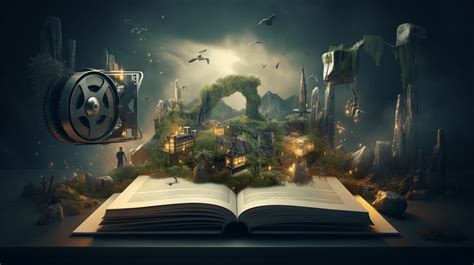The film industry has undergone a significant transformation over the years, driven by rapid advancements in technology. The intersection of innovation and cinematic storytelling has given birth to new and exciting ways of producing, distributing, and consuming films. The Film Tech Forum is a platform that brings together industry experts, filmmakers, and tech enthusiasts to explore the latest trends, challenges, and opportunities in the field. In this article, we will delve into the world of film technology and examine the ways in which innovation is shaping the future of cinematic storytelling.
The Evolution of Film Technology

The history of film technology is a long and winding road, marked by significant milestones and innovations. From the early days of silent films to the advent of sound, color, and digital technology, the industry has continually adapted to new tools and techniques. Today, we are witnessing a new era of technological advancements, driven by the likes of artificial intelligence, virtual reality, and blockchain.
The Rise of Digital Cinematography
The transition from film to digital cinematography has been a significant turning point in the industry. Digital cameras have revolutionized the way films are shot, edited, and distributed. With the ability to capture high-quality images and footage, digital cinematography has opened up new creative possibilities for filmmakers. Moreover, the cost savings and increased efficiency of digital technology have made it more accessible to independent filmmakers and producers.
Virtual Reality and Immersive Storytelling

Virtual reality (VR) and augmented reality (AR) are changing the way we experience films. Immersive storytelling has become a new frontier in cinematic innovation, allowing audiences to engage with films in entirely new ways. From VR headsets to interactive installations, the possibilities for immersive storytelling are vast and exciting.
Artificial Intelligence in Film Production
Artificial intelligence (AI) is being used in various aspects of film production, from scriptwriting to editing and visual effects. AI-powered tools can analyze vast amounts of data, identify patterns, and make predictions, freeing up creatives to focus on the artistic aspects of filmmaking. Moreover, AI can help streamline the production process, reducing costs and increasing efficiency.
Blockchain and the Future of Film Distribution

Blockchain technology is being explored as a new way to distribute films. By using a decentralized and transparent ledger system, filmmakers can ensure that their work is protected and that they receive fair compensation for their creative labor. Moreover, blockchain can help reduce piracy and ensure that films are distributed securely and efficiently.
Crowdfunding and the Democratization of Film Production
Crowdfunding has democratized film production, allowing filmmakers to raise funds from a large number of people, typically through online platforms. This model has enabled independent filmmakers to produce films outside of the traditional studio system, giving them more creative control and flexibility. Moreover, crowdfunding has helped to promote diversity and inclusivity in the industry, by providing opportunities for underrepresented voices to be heard.
The Impact of Social Media on Film Marketing

Social media has transformed the way films are marketed and promoted. With the rise of platforms like Facebook, Twitter, and Instagram, filmmakers can now reach a global audience and engage with fans in real-time. Social media has also enabled the creation of targeted marketing campaigns, allowing filmmakers to reach specific demographics and interests.
The Role of Influencers in Film Promotion
Influencers have become a key part of film promotion, with many studios partnering with social media influencers to promote their films. Influencers can help reach a wider audience, build buzz, and create a sense of excitement around a film. Moreover, influencers can provide valuable feedback and insights, helping filmmakers to refine their marketing strategies.
Conclusion: The Future of Film Technology
The future of film technology is exciting and uncertain, with new innovations and advancements emerging all the time. As the industry continues to evolve, it is clear that technology will play an increasingly important role in shaping the future of cinematic storytelling. Whether it is through the use of AI, VR, or blockchain, the possibilities for innovation are vast and exciting.






What is the future of film technology?
+The future of film technology is exciting and uncertain, with new innovations and advancements emerging all the time. As the industry continues to evolve, it is clear that technology will play an increasingly important role in shaping the future of cinematic storytelling.
How is artificial intelligence being used in film production?
+Artificial intelligence is being used in various aspects of film production, from scriptwriting to editing and visual effects. AI-powered tools can analyze vast amounts of data, identify patterns, and make predictions, freeing up creatives to focus on the artistic aspects of filmmaking.
What is the role of influencers in film promotion?
+Influencers have become a key part of film promotion, with many studios partnering with social media influencers to promote their films. Influencers can help reach a wider audience, build buzz, and create a sense of excitement around a film.
We hope you have enjoyed this article on the intersection of innovation and cinematic storytelling. As the film industry continues to evolve, it is clear that technology will play an increasingly important role in shaping the future of filmmaking. Whether you are a filmmaker, producer, or simply a film enthusiast, we invite you to join the conversation and share your thoughts on the future of film technology.
